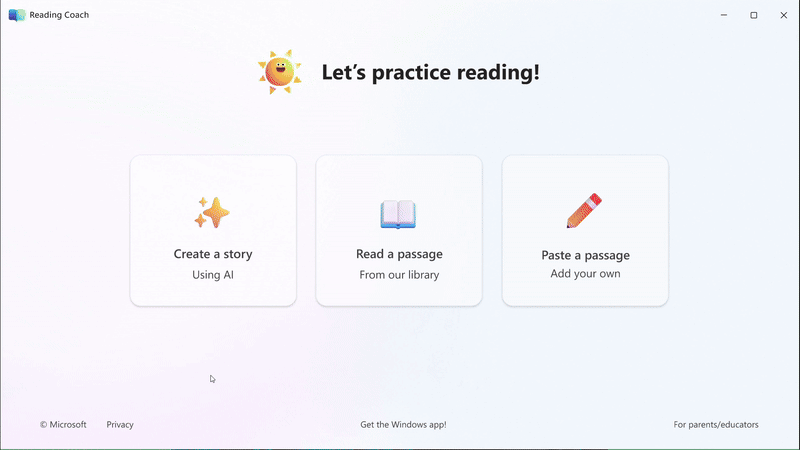Microsoft today made Reading Coach, its AI-powered tool that provides learners with personalized reading practice, available at no cost to anyone with a Microsoft account.
As of this morning, Reading Coach is accessible on the web in preview — a Windows app is forthcoming. And soon (in late spring), Reading Coach will integrate with learning management systems such as Canva, Microsoft says.
“It’s well known that reading is foundational to a student’s academic success; studies show that fluent readers are four times more likely to graduate high school and get better jobs,” Microsoft writes in a blog post. “With the latest AI technology, we have an opportunity to provide learners with personalized, engaging, and transformative reading experiences.”
Reading Coach builds on Reading Progress, a plug-in for the education-focused version of Microsoft Teams, Teams for Education, designed to help teachers foster reading fluency in their students. Inspired by the success of Reading Progress (evidently), Microsoft launched Reading Coach in 2022 as a part of Teams for Education and Immersive Reader, the company’s cross-platform assistive service for language and reading comprehension.

Image Credits: Microsoft
Reading Coach works by having learners identify words they struggle with the most and presenting them with tools to support independent, individualized practice. Based on an educator’s preferences, the tools available can include text to speech, syllable breaking and picture dictionaries.
After a learner practices in Reading Coach, educators can view their work, including which words the student practiced, how many attempts they made and which tools they used. Educators can also share this information with students if they choose.
Recently, Reading Coach received a spruce-up in the form of a “choose your own story” feature, powered by Microsoft’s Azure OpenAI Service, that lets learners tap AI to generate their own narrative adventure.
Akin to the AI-generated story tool on the Amazon Echo Show, Reading Coach’s “choose your own story” has learners select a character, setting and reading level and have AI create content based on these selections and the learner’s most challenging words. (Microsoft says that story content is moderated and filtered for things like “quality, safety and age appropriateness.”) Reading Coach provides feedback on pronunciation, listening to the learner read the story and awarding badges that unlock new characters and scenes as they progress.
Learners who opt not to create their own story can pick from curated passages in ReadWorks, a library of resources for reading comprehension.
“Reading Coach intrinsically motivates learners to continue advancing their skills in several ways,” Microsoft continues. “With the use of AI in an impactful, safe, responsible way, we believe that personalized learning at scale is within reach.”
Microsoft’s rosy view of AI for teaching reading comprehension isn’t shared by all educators, it’s key to note. Experts say that there isn’t a foolproof tool on the market for measuring comprehension, which involves assessing what students know and the strength of their vocabulary as well as whether they can sound out and pronounce words. Students can inadvertently affect evaluations by pressing a wrong button. Or they might get bored with a task a tool’s presenting to them and disengage, leading to a low score.
All that being said, teachers don’t think tools like Reading Coach can hurt. In a recent EdWeek Research Center survey, 44% of educators said that they think adaptive tech does a better job of accurately assessing a students’ reading level than non-adaptive software or pen-and-paper methods.
techcrunch.com




